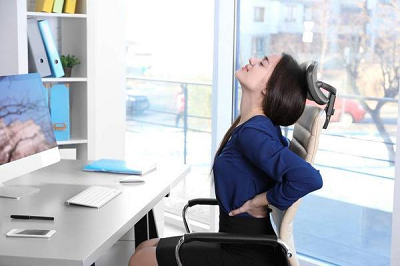Can Pelvic Inflammatory Disease Cause Diarrhea?
Pelvic inflammatory disease is the inflammation of female pelvic reproductive organs and connective tissue around the uterus and pelvic peritoneum. It is divided into acute pelvic inflammatory disease and chronic pelvic inflammatory disease.

Pelvic inflammatory disease can cause diarrhea. The uterus is located in front of the rectum. When suffering from pelvic inflammatory disease, the posterior uterine pelvic occurs congestion (premenstrual pelvic congestion is heavier). The uterine congestion becomes soft, closer to the rectum, oppressing the sacral nerve to produce a sinking feeling. The uterus compresses the rectum and constricts the rectal mucosa to cause defecation.
If a pregnant woman suffers from pelvic inflammatory disease, the pelvic cavity and uterus will be congested severely. The inflammation spreads to the rectum, which will irritate the rectum and cause diarrhea. Therefore, whether pelvic inflammatory disease can cause diarrhea depends on the severity of the condition.
How do different degrees of pelvic inflammatory disease affect diarrhea?
1. Mild pelvic inflammatory disease. Mild pelvic inflammatory disease does not cause diarrhea. Pelvic inflammatory disease is a common gynecological disease, mainly caused by infection of the patient's pelvic cavity, which may cause women to experience symptoms of irregular menstruation, menstrual disorders, and abdominal pain. However, mild pelvic inflammatory disease does not cause diarrhea.
2. Moderate pelvic inflammatory disease. The moderate pelvic disease is a more severe disease that may cause patients to experience abdominal pain symptoms. However, mild pelvic inflammatory disease only infects the pelvic cavity of women and generally does not affect the patient's stomach, so it will not cause diarrhea in the patient. If the patient has diarrhea, it may be caused by abnormal gastrointestinal function, and he should go to the hospital for relevant examinations in time.
3. Severe pelvic inflammatory disease. If the patient suffers from a severe pelvic inflammatory disease, it may cause diarrhea. Under normal circumstances, if there are symptoms of diarrhea, the patient's digestive function is likely abnormal. The pelvic cavity is mainly located in the abdomen of women. If the patient is infected with a severe pelvic inflammatory disease, bacteria are likely to breed in the patient's digestive tract, which can easily lead to diarrhea.
If patients with pelvic inflammatory diseases are not treated promptly, it can cause stomach pain and diarrhea, seriously affecting women's menstruation. If the condition of patients with pelvic inflammatory diseases is more serious, it may also lead to infertility and seriously affect women's health. Therefore, patients with pelvic inflammatory diseases should go to the hospital for treatment in time. Oral Chinese medicine Fuyan Pill can relieve symptoms.
1. Pay attention to menstrual hygiene
Patients with pelvic inflammatory diseases must pay attention to the hygiene of private parts during menstruation. During menstruation, due to vaginal bleeding, the genitals of female friends will be relatively moist, which is conducive to the growth of bacteria. Therefore, patients with pelvic inflammatory diseases must keep the vulva dry and clean during menstruation to avoid the growth of bacteria and prevent the vagina from being infected by bacteria. Infect.
2. Pay attention to diet
Patients with pelvic inflammatory diseases should not eat spicy food in daily life. Spicy food stimulates the body and affects the endocrine, which is not conducive to treating pelvic inflammatory disease.
3. Regular checks
Going to the hospital for regular checks can better understand your physical condition, such as whether a pelvic inflammatory disease is completely cured, what factors affect the treatment effect, and so on. Check out these factors to better prevent and treat pelvic inflammatory disease.
4. Pay attention to rest
Patients with the pelvic inflammatory disease must pay attention to rest and avoid fatigue during the illness. Bed rest during an acute attack to relieve physical discomfort. After the condition is improved, the patient can participate in moderate sports activities according to his recovery, such as brisk walking, jogging, yoga, etc. Proper exercise can promote blood circulation in the body and, at the same time, promote the absorption of inflammation, which is also helpful for the recovery of the disease.
Recommended Readings:
Pelvic Inflammatory Disease Prevention: Your Living Habits Matter
previous pageHow to Prevent Acute Episodes of Chronic Pelvic Inflammatory Disease(PID)?
next page
You may also be interested in
- Daily Care Tips for Pelvic Inflammatory Disease Caused by Ureaplasma Urealyticum
- Treatment of PID
- Why Does Pelvic Inflammatory Disease Cause Fatigue? Don't Ignore These 5 Symptoms!
- Can Abnormal Vaginal Discharge Cause Pelvic Inflammatory Disease?
- Can Pelvic Inflammatory Disease Cause Intestinal Symptoms?
Testimonials
- Adenomyosis with Ureaplasma Urealyticum Cured by Fuyan Pill
- Tubal blockage with hydrosalpinx can be cured by TCM shortly
- Fuyan Pill Helps A woman with Adenomyosis Get Pregnant
- A Woman with Hydrosalpinx Is Cured with Fuyan pill
- Pelvic Inflammatory Disease Testimonials
- Irregular Vaginal Bleeding and Endometrial Thickening Cured by Fuyan Pill
- Pruritus Vulvae and Frequent Urination: Mycoplasma Infection Cured after 2 Courses



